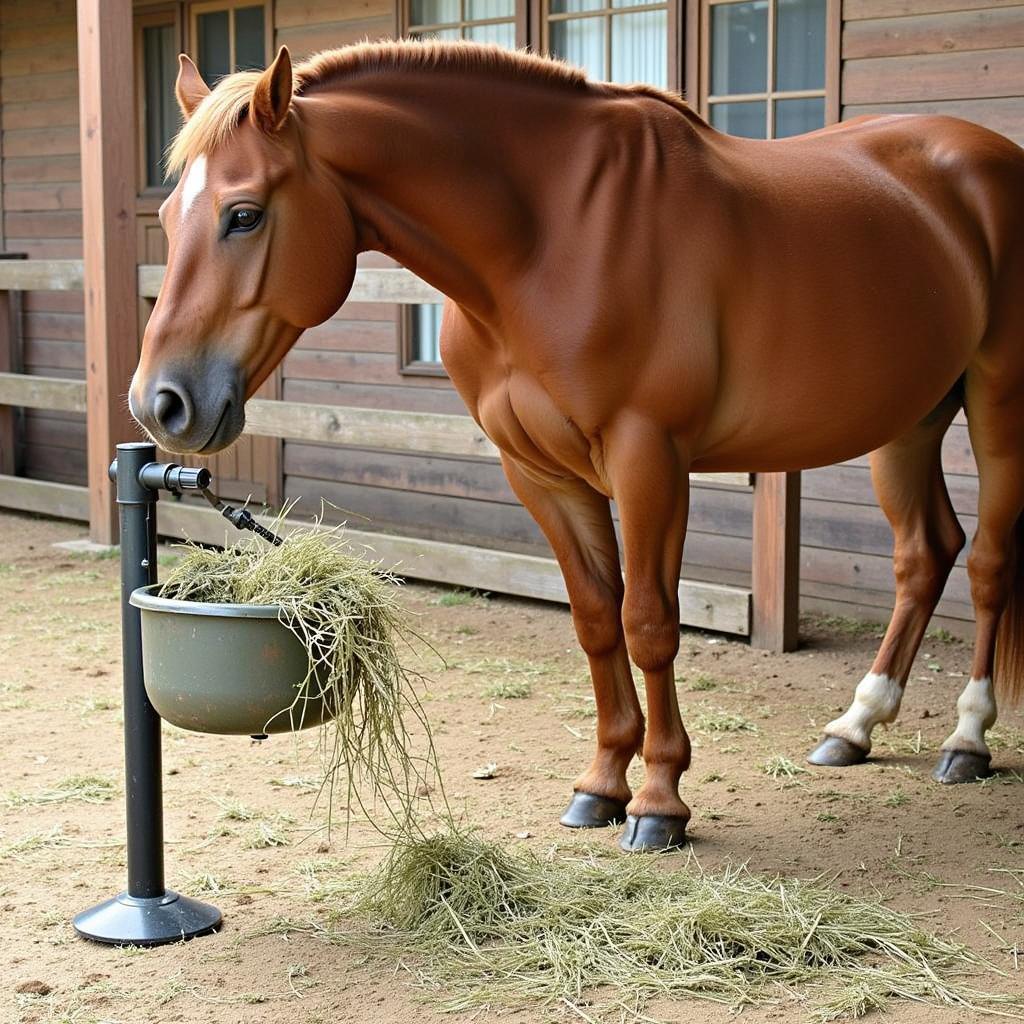Hay Feeder Horses are a common topic of discussion among horse owners. Proper nutrition is crucial for equine health, and understanding how different hay feeders can impact a horse’s diet is essential for responsible ownership. Choosing the right hay feeder can significantly affect a horse’s well-being, from preventing digestive issues to minimizing hay waste.
Choosing the Right Hay Feeder for Your Horses
Selecting the right hay feeder for your horses can seem daunting, with numerous options available. Consider your horse’s individual needs, your budget, and management style. Do you have a horse prone to colic? A slow feeder might be a wise investment. Are you tired of wasted hay? A no-waste hay feeder could be the solution. no waste hay feeder for horses
What are the benefits of slow feeding? Slow feeding mimics natural grazing behavior, reducing the risk of digestive upsets and promoting better dental health by encouraging more chewing. It also extends feeding time, which can be beneficial for horses prone to boredom or anxiety. Furthermore, slow feeders can significantly reduce hay waste, saving you money in the long run.
Different Types of Hay Feeders
Several types of hay feeders cater to different needs and preferences. From simple hay nets to elaborate automated systems, the options can be overwhelming. Let’s explore some common types:
- Hay Nets: These are a cost-effective and portable option, ideal for slowing down consumption. Choose a net with small holes for maximum benefit.
- Hay Racks: Traditional hay racks offer a straightforward solution, but can be prone to hay wastage.
- Slow Feed Hay Bags: These bags combine the portability of hay nets with the slow-feeding benefits of small openings.
- Automatic Hay Feeders: automatic hay feeder for horses These feeders offer timed and portion-controlled feeding, ideal for busy horse owners.
Managing Hay Waste with Hay Feeder Horses
Minimizing hay waste is a key concern for horse owners. Wasted hay not only increases feed costs, but it can also contribute to respiratory problems if it becomes moldy or dusty. Using appropriate hay feeder horses can dramatically reduce this waste.
Tips for Reducing Hay Waste
- Choose the right feeder: Select a feeder that suits your horse’s eating habits and minimizes spillage. hay slow feeders for horses
- Proper placement: Position the feeder away from high-traffic areas to prevent accidental tipping or contamination.
- Feed appropriate amounts: Don’t overfill the feeder. Provide only the amount of hay your horse can consume in a reasonable timeframe.
- Monitor and adjust: Regularly assess your horse’s feeding habits and make adjustments to the feeder or feeding schedule as needed.
“Investing in a good quality, well-designed hay feeder is one of the best things you can do for your horse’s health and your wallet,” says Dr. Emily Carter, Equine Nutritionist. “It’s about optimizing their digestion and minimizing waste.”
 Horse Eating from a Hay Feeder
Horse Eating from a Hay Feeder
Hay Feeder Horses: FAQs
1. What is a hay feeder horse? The term “hay feeder horse” refers to a horse whose diet primarily consists of hay, often delivered through various types of feeders.
2. Why are hay feeders important? Hay feeders promote healthy eating habits, reduce waste, and can prevent digestive issues.
3. What type of hay feeder is best for my horse? The best type depends on your horse’s individual needs, your budget, and management style. Consult with your veterinarian or an equine nutritionist for personalized recommendations.
4. How can I reduce hay waste? Choose the right feeder, place it strategically, feed appropriate amounts, and monitor your horse’s feeding habits.
5. Are automatic hay feeders worth the investment? automatic hay feeder horses Automatic feeders can be beneficial for busy owners and horses requiring specific feeding schedules.
6. What are the benefits of slow feeding? Slow feeding mimics natural grazing, improves digestion, promotes dental health, and reduces boredom.
7. Where can I find the best slow hay feeder for my horse? Consider factors like your horse’s size, eating habits, and your budget. Research different brands and read reviews to find the best option. best slow hay feeder for horses
In conclusion, selecting the right hay feeder for your hay feeder horses is crucial for their overall health and well-being. By understanding the different types of feeders available and implementing strategies to reduce waste, you can ensure your horse receives optimal nutrition while minimizing costs.
For any assistance, please contact us at Phone Number: 0772127271, Email: [email protected] Or visit us at: QGM2+WX2, Vị Trung, Vị Thuỷ, Hậu Giang, Việt Nam. We have a 24/7 customer service team.